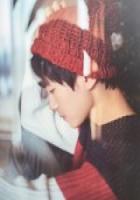Voices were borne over to them at that instant on the wind and raindrops from the other side of the wall. There came such words as "sacks", "quarters", "threshing", "tailing", "next Saturday's market", each sentence being disorganized by the gusts like a face a cracked mirror. Both the women listened.
"Who are those?" said the lady.
"One is my father. He rents that yard and barn."The lady seemed to forget the immediate business in listening to the technicalities of the corn trade. At last she said suddenly, "Did you tell him where you were going to?""No."
"O - how was that?"
"I thought it safer to get away first - as he is so uncertain in his temper.""Perhaps you are right... Besides, I have never told you my name. It is Miss Templeman... Are they gone - on the other side?""No. They are only gone up into the granary.""Well, it is getting damp here. I shall expect you today - this evening, say, at six.""Which way shall I come, ma'am?"
"The front way - round by the gate. There is no other that I have noticed."Elizabeth-Jane had been thinking of the door in the alley.
"Perhaps, as you have not mentioned your destination, you may as well keep silent upon it till you are clear off. Who knows but that he may alter his mind?"Elizabeth-Jane shook her head. "On consideration I don't fear it," she said sadly. "He has grown quite cold to me.""Very well. Six o'clock then."
When they had emerged upon the open road and parted, they found enough to do in holding their bowed umbrellas to the wind. Nevertheless the lady looked in at the corn-yard gates as she passed them, and paused on one foot for a moment. But nothing was visible there save the ricks, and the humpbacked barn cushioned with moss, and the granary rising against the church-tower behind, where the smacking of the rope against the flag-staff still went on.
Now Henchard had not the slightest suspicion that Elizabeth-Jane's movement was to be so prompt. Hence when, just before six, he reached home and saw a fly at the door from the King's Arms, and his stepdaughter, with all her little bags and boxes, getting into it, he was taken by surprise.
"But you said I might go, father?" she explained through the carriage window.
"Said! - yes. But I thought you meant next month, or next year. 'Od, seize it - you take time by the forelock! This, then, is how you be going to treat me for all my trouble about ye?""O father! how can you speak like that? It is unjust of you!" she said with spirit.
"Well, well, have your own way," he replied. He entered the house, and, seeing that all her things had not yet been brought down, went up to her room to look on. Her had never been there since she had occupied it. Evidences of her care, of her endeavours for improvement, were visible all around, in the form of books, sketches, maps, and little arrangements for tasteful effects. Henchard had known nothing of these efforts. He gazed at them, turned suddenly about, and came down to the door.
"Look here," he said, in an altered voice - he never called her by name now - "don't 'ee go away from me. It may be I've spoke roughly to you -but I've been grieved beyond everything by you - there's something that caused it.""By me?" she said, with deep concern. "What have I done?""I can't tell you now. But if you'll stop, and go on living as my daughter.
I'll tell you all in time."
But the proposal had come ten minutes too late. She was in the fly -was already, in imagination, at the house of the lady whose manner had such charms for her. "Father," she said, as considerately as she could.
"I think it best for us that I go on now. I need not stay long; I shall not be far away; and if you want me badly I can soon come back again."He nodded ever so slightly, as a receipt of her decision and no more.
"You are not going far, you say. What will be your address, in case I wish to write to you? Or am I not to know?""Oh yes - certainly. It is only in the town - High-Place Hall.""Where?" said Henchard, his face stilling.
She repeated the words. He neither moved nor spoke, and waving her hand to him in utmost friendliness she signified to the flyman to drive up the street.
HARDY: The Mayor of Casterbridge - * XXII *















